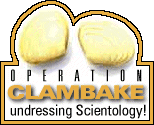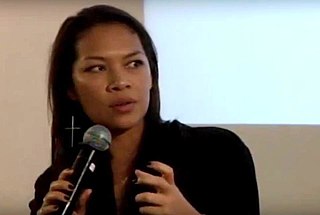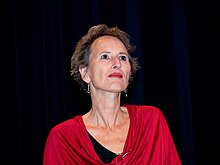
Xenu, also called Xemu, is a figure in the Church of Scientology's secret "Advanced Technology", a sacred and esoteric teaching. According to the "Technology", Xenu was the extraterrestrial ruler of a "Galactic Confederacy" who brought billions of his people to Earth in DC-8-like spacecraft 75 million years ago, stacked them around volcanoes, and killed them with hydrogen bombs. Official Scientology scriptures hold that the thetans of these aliens adhere to humans, causing spiritual harm.

There are a number of disputes concerning the Church of Scientology's attempts to suppress material critical of Scientology and the organization on the Internet, utilizing various methods – primarily lawsuits and legal threats, as well as front organizations. In late 1994, the organization began using various legal tactics to stop distribution of unpublished documents written by L. Ron Hubbard. The organization has often been accused of barratry through the filing of SLAPP suits. The organization's response is that its litigious nature is solely to protect its copyrighted works and the unpublished status of certain documents.
The Penet remailer was a pseudonymous remailer operated by Johan "Julf" Helsingius of Finland from 1993 to 1996. Its initial creation stemmed from an argument in a Finnish newsgroup over whether people should be required to tie their real name to their online communications. Julf believed that people should not—indeed, could not—be required to do so. In his own words:

The Church of Scientology has been involved in numerous court disputes across the world. In some cases, when the Church has initiated the dispute, questions have been raised as to its motives. The Church of Scientology says that its use of the legal system is necessary to protect its intellectual property and its right to freedom of religion. Critics say that most of the organization's legal claims are designed to harass those who criticize it and its manipulative business practices.

XS4ALL was an Internet service provider (ISP) in the Netherlands. It was founded in 1993 as an offshoot of the hackers club Hack-Tic by Felipe Rodriquez, Rop Gonggrijp, Paul Jongsma and Cor Bosman, while based in Amsterdam. It was the sixth provider in the Netherlands and the second company to offer Internet access to private individuals. Initially only offering dial-in services via modem and ISDN, it later expanded to offer dial-up access as well as ADSL, VDSL, and fiber-optic (FTTH) services as well as mobile internet. The name is a play on the English pronunciation of access for all.

The Fishman Affidavit is a set of court documents submitted by self-professed ex-Scientologist Steven Fishman in 1993 in the federal case, Church of Scientology International v. Fishman and Geertz (Case No. CV 91-6426.

Arnaldo Pagliarini Lerma was an American writer and activist, a former Scientologist, and a critic of the Church of Scientology who appeared in television, media and radio interviews. Lerma was the first person to post the court document known as the Fishman Affidavit, including the Xenu story, to the Internet via the Usenet newsgroup alt.religion.scientology.

OT VIII or OT 8 is the highest current auditing level in Scientology. OT VIII is known as "The Truth Revealed" and was first released to select high-ranking public Scientologists in 1988, two years after the death of Scientology's founder, L. Ron Hubbard. OT VIII is only delivered to members of the Church of Scientology in one place—aboard the organization's private cruise ship, the Freewinds, and is additionally available from independent Scientology groups. There are a few advanced auditors that are able to deliver the level to those who meet the prerequisites.
According to the beliefs of the Church of Scientology, the Marcab Confederacy is said to be one of the most powerful galactic civilizations still active. Church founder L. Ron Hubbard describes it as:
Various planets united into a very vast civilization which has come forward up through the last 200,000 years, formed out of the fragments of earlier civilizations. In the last 10,000 years they have gone on with a sort of decadent kicked-in-the-head civilization that contains automobiles, business suits, fedora hats, telephones, spaceships — a civilization which looks almost an exact duplicate but is worse off than the current US civilization.
File sharing is the practice of distributing or providing access to digital media, such as computer programs, multimedia, program files, documents or electronic books/magazines. It involves various legal aspects as it is often used to exchange data that is copyrighted or licensed.
According to research done by the Organisation for Economic Co-operation and Development (OECD), the Netherlands is ranked with Switzerland in having the most broadband subscriptions per 100 inhabitants, has no bandwidth caps, and has the most homes passed in Europe in terms of connection speeds of 50 Mbit/s and higher.

Karin Pouw is a French-born American official within the Church of Scientology International. Since 1993, she has held the position of Director of Public Affairs in the Office of Special Affairs (OSA) and serves as one of Scientology's international spokespersons.

The Online Copyright Infringement Liability Limitation Act (OCILLA) is United States federal law that creates a conditional 'safe harbor' for online service providers (OSP), a group which includes Internet service providers (ISP) and other Internet intermediaries, by shielding them for their own acts of direct copyright infringement as well as shielding them from potential secondary liability for the infringing acts of others. OCILLA was passed as a part of the 1998 Digital Millennium Copyright Act (DMCA) and is sometimes referred to as the "Safe Harbor" provision or as "DMCA 512" because it added Section 512 to Title 17 of the United States Code. By exempting Internet intermediaries from copyright infringement liability provided they follow certain rules, OCILLA attempts to strike a balance between the competing interests of copyright owners and digital users.

Operation Clambake, also referred to by its domain name, xenu.net, is a website and Norway-based non-profit organization, launched in 1996, founded by Andreas Heldal-Lund, that publishes criticism of the Church of Scientology. It is owned and maintained by Andreas Heldal-Lund, who stated that he supported the rights of all people to practice Scientology or any religion. Operation Clambake has referred to the Church of Scientology as "a vicious and dangerous cult that masquerades as a religion". The website includes texts of petitions, news articles, exposés, and primary source documents. The site has been ranked as high as the second spot in Google searches for the term "Scientology".

Mohammed Benzakour is a Moroccan-Dutch columnist, essayist, poet, writer and politician. He is the third child in a family of five. At age three, he and mother and siblings settle in Zwijndrecht, Netherlands, where his father worked. He graduated from high school at vwo level and studied sociology at Leiden University and later political science and moved to Rotterdam to finish his master. Meanwhile, he joined the Labour Party. He started his journalism career working for De Volkskrant and also published in NRC Handelsblad, De Groene Amsterdammer and Vrij Nederland. He received the ASN Media Prize in 1999 and the Silver Zebra in 2001 for insights in a 'society in motion'. He later published two books, Abou Jahjah: Nieuwlichter of Oplichter. De demonisering van een politiek rebel in 2004 and Osama's Grot, Allah, Holland en ik, a compilation of his columns, articles and essays from 2001 until 2005, the year of publication. In that same year he also won the Peace Prize for Journalism. In 2008 his 'Stinkende Heelmeesters' was published, a compilation of essays, reviews, columns and reports from 2001 to 2008.

This is a list on countries where at least one internet service provider (ISP) formerly or currently censors the popular file sharing website The Pirate Bay (TPB).

Karin Amatmoekrim is a Surinamese writer. She has written five novels and won the 2009 Black Magic Woman Literature Prize for Titus.
The Foundation George Mosse Fund of the University of Amsterdam is a Dutch foundation (stichting) that aims to promote gay and lesbian studies. It was founded in 2001 at the University of Amsterdam, with a bequest from George Mosse's inheritance, given out of appreciation for the cultural-historical education and research on homosexuality in Amsterdam. The foundation is known primarily for its Mosse Lectures and its QueerTalk events.

Eva Hartog is a Dutch journalist and contributor to De Groene Amsterdammer and Politico Europe. She joined the English language Moscow-based newspaper, The Moscow Times, in 2013 at the age of 25 going on to serve as the publication's editor in chief between 2017 and 2019.
The Church of Scientology has been active in the Netherlands since 1972, opening its first church in Amsterdam in 1974.
















